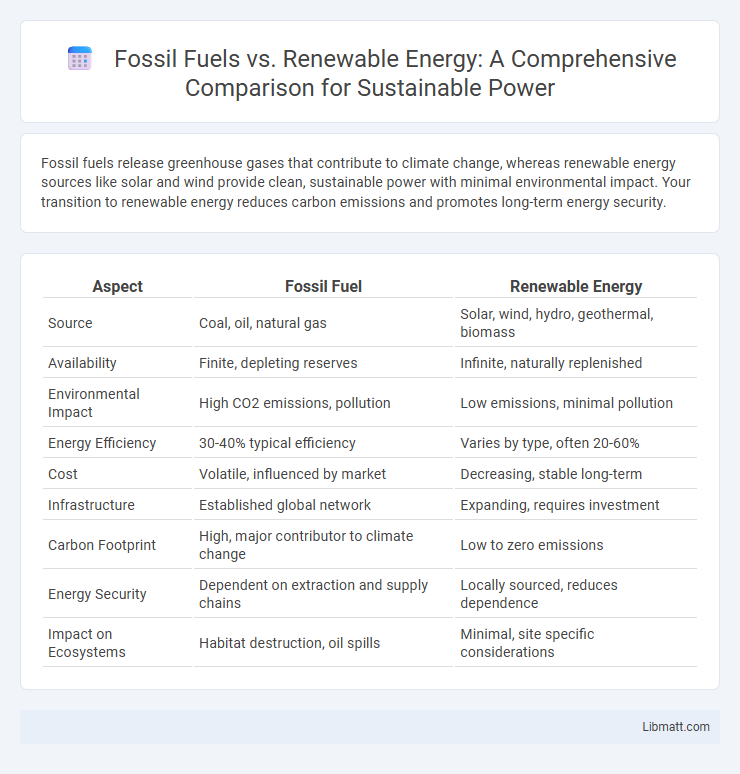Fossil fuels release greenhouse gases that contribute to climate change, whereas renewable energy sources like solar and wind provide clean, sustainable power with minimal environmental impact. Your transition to renewable energy reduces carbon emissions and promotes long-term energy security.
Table of Comparison
| Aspect | Fossil Fuel | Renewable Energy |
|---|---|---|
| Source | Coal, oil, natural gas | Solar, wind, hydro, geothermal, biomass |
| Availability | Finite, depleting reserves | Infinite, naturally replenished |
| Environmental Impact | High CO2 emissions, pollution | Low emissions, minimal pollution |
| Energy Efficiency | 30-40% typical efficiency | Varies by type, often 20-60% |
| Cost | Volatile, influenced by market | Decreasing, stable long-term |
| Infrastructure | Established global network | Expanding, requires investment |
| Carbon Footprint | High, major contributor to climate change | Low to zero emissions |
| Energy Security | Dependent on extraction and supply chains | Locally sourced, reduces dependence |
| Impact on Ecosystems | Habitat destruction, oil spills | Minimal, site specific considerations |
Introduction to Fossil Fuels and Renewable Energy
Fossil fuels, including coal, oil, and natural gas, are non-renewable energy sources formed from ancient organic matter and currently supply over 80% of global energy consumption. Renewable energy sources such as solar, wind, hydro, and geothermal harness natural processes that are replenished continuously, providing sustainable alternatives with lower environmental impact. Transitioning from fossil fuels to renewable energy is critical for reducing carbon emissions and combating climate change.
Environmental Impact Comparison
Fossil fuels release significant greenhouse gases like CO2 and methane, driving climate change and causing air pollution that harms ecosystems and human health. Renewable energy sources such as solar, wind, and hydroelectric power produce little to no emissions during operation, drastically reducing your carbon footprint and improving air quality. Transitioning to renewable energy mitigates environmental damage by preserving natural resources and promoting sustainable energy use.
Cost and Economic Factors
Renewable energy sources often have higher upfront installation costs but significantly lower operational expenses compared to fossil fuels, which face fluctuating prices due to market volatility and depletion risks. Government incentives, technological advancements, and economies of scale are rapidly reducing the overall levelized cost of energy (LCOE) for solar and wind power, making them increasingly competitive. Your long-term savings and economic benefits improve by investing in renewables, as they mitigate exposure to fuel price instability and environmental regulation costs.
Energy Efficiency and Reliability
Renewable energy sources such as solar and wind have seen significant improvements in energy efficiency, with advanced technology enabling higher conversion rates of natural resources into usable power. Fossil fuels, while traditionally reliable due to established infrastructure and consistent output, face challenges with energy losses during extraction and combustion processes. Grid integration advancements and energy storage solutions are enhancing the reliability of renewable energy, making it a competitive alternative to fossil fuels in both efficiency and dependable energy supply.
Resource Availability and Sustainability
Fossil fuels, including coal, oil, and natural gas, are finite resources with limited reserves that are gradually depleting due to extensive consumption. Renewable energy sources such as solar, wind, and hydroelectric power are abundant and naturally replenished, ensuring long-term availability and sustainability. Your transition to renewable energy supports environmental preservation and reduces reliance on non-renewable resources that contribute to pollution and climate change.
Technological Advancements
Technological advancements in renewable energy, such as improved solar panels and wind turbines, have significantly increased efficiency and reduced costs, making clean energy more accessible. Fossil fuel technologies face challenges with emissions and finite resources, limiting long-term sustainability. Your investment in modern renewables supports innovation that drives a cleaner, more resilient energy future.
Government Policies and Regulations
Government policies and regulations play a crucial role in shaping the transition from fossil fuels to renewable energy by offering subsidies, tax incentives, and mandates for clean energy adoption. Many countries have implemented carbon pricing and emissions trading systems to discourage fossil fuel use while promoting wind, solar, and other renewable technologies. Your investment decisions and energy consumption can benefit from understanding these evolving regulatory frameworks aimed at reducing greenhouse gas emissions and achieving sustainability goals.
Societal and Health Implications
Fossil fuel consumption releases pollutants like particulate matter and greenhouse gases, contributing to respiratory diseases, cardiovascular problems, and climate change impacts on public health. Renewable energy sources, such as solar and wind, produce minimal emissions, reducing air pollution and associated health risks, thus promoting better community well-being. Transitioning Your energy reliance to renewables supports a healthier society by mitigating environmental hazards tied to fossil fuels.
Transition Challenges and Opportunities
Transitioning from fossil fuels to renewable energy presents challenges such as infrastructure upgrades, energy storage limitations, and economic shifts impacting fossil fuel-dependent regions. Opportunities include job creation in renewable sectors, improved public health from reduced emissions, and enhanced energy security through diverse, sustainable sources. Your role in supporting policy changes and adopting clean technologies can accelerate this critical energy transition.
Future Outlook and Global Trends
Renewable energy sources like solar, wind, and hydropower are experiencing rapid global growth due to declining costs, technological advancements, and increasing government support aimed at reducing carbon emissions. Fossil fuel dependence is expected to decline as countries implement stricter regulations and invest heavily in clean energy infrastructure, aligning with international climate goals. Your transition to renewable energy can capitalize on these trends, ensuring long-term sustainability and resilience in the evolving energy market.
Fossil Fuel vs Renewable Energy Infographic

 libmatt.com
libmatt.com